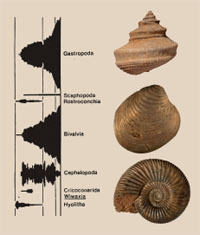B. High diversity on all levels - why are molluscs so successful?
 The Mollusc Symposium
The Mollusc Symposium
Alex Nützel & Michael Amler
The symposium on fossil molluscs will be a contribution to the UN Year of Biodiversity. It is well-known that molluscs form a large part of the invertebrate fossil record. Especially bivalves, gastropods, and cephalopods are among the most diverse groups. We are looking for contributions which describe the continuous mollusc radiation and address the question why molluscs have become so important. This includes extinction resistance, rapid recovery after mass extinctions, and adaptive radiations caused by a great variety in trophic modes and various environmental adaptations. In addition it should also embrace all aspects of molluscan paleobiology including phylogeny, systematics, and stratigraphy. Although the focus of the symposium is on fossil molluscs, zoological contributions are also most welcome. The conference language for the symposium is English.
Keynotes
Michal Kowalewski: Macroevolution and macroecology of mollusc-dominated benthic associations
Gerhard Haszprunar: News and thoughts on Monoplacophora: their role in molluscan phylogeny
Michal Kowalewski (Virginia Tech) and Gerhard Haszprunar (Zoologische Staatssammlung Munich) will present keynotes. Michal Kowalewski is one of the most distinguished paleobiologists with a strongfocus on paleoecology and paleodiversity; Gerhard Haszprunar presented key contributions to our understanding of molluscan phylogeny.
For questions about the mollusc symposium contact Alex Nützel (![]() E-Mail) or Michael Amler (
E-Mail) or Michael Amler (![]() E-Mail).
E-Mail).
Download PDF "The Mollusc Symosium"





